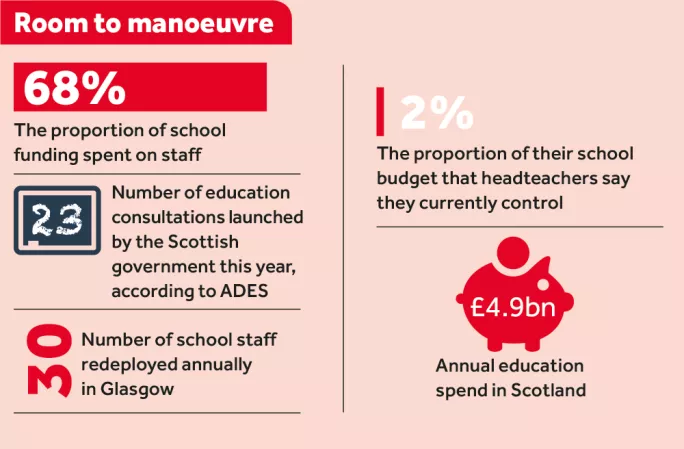
A ‘double-edged sword’ for heads

The education director in Scotland’s biggest local authority has warned that heads refusing to take teachers on compulsory transfers is a “double-edged sword”.
Teachers can currently be transferred to another school in the same council if they become surplus to requirements because of a falling roll - or the curriculum in their school changing. Sometimes staff might also request a transfer if, for example, they move house and want to teach closer to home.
However, education secretary John Swinney recently revealed, as part of the government plans to give more power and money directly to headteachers, that he intended to give them the ability to select their own staff teams, including the right to refuse to take staff on compulsory transfer.
The consultation on the new Education Bill, published this month, reiterates the intention to give heads the right to refuse to accept staff who are being redeployed.
However, Glasgow education director Maureen McKenna - who is also president of the education directors’ body ADES - has warned that the policy shift could have an “unintended consequence”. While freeing up headteachers to choose their own staff, she said, it could also lead to schools where the curriculum is “rigidly” shaped “around the current staff group” because teachers are less likely to move.
In a school where the pupil roll fell, headteachers could find themselves “not able to reduce the staff budget”, she added.
Speaking at the ADES annual conference in Cumbernauld last week, Ms McKenna added: “Where is the flexibility there - and how does that meet the needs of every child? I don’t believe that is the policy intention, but it could be an unintended consequence.”
‘No malevolence’
In a question-and-answer session with Mr Swinney at the event, Jim Wilson, Glasgow City Council’s head of service and quality improvement for north west, said another “unintended consequence” of empowering headteachers could be that no one has a “holistic view” of school staffing.
One Glasgow primary has recently been close to sending pupils home because of staff absences, he said. All senior management were having to take classes, and assemblies were being held to give teachers their entitlement to non-class contact time.
However, the authority has been able to redistribute teachers from a neighbouring school, which was overstaffed. If this power was at headteacher level, it would be “much more difficult to have that movement in the system”, Mr Wilson said.
Mr Swinney said councils would continue to have an overview of staffing because they would remain the employers. He had no intention of creating separate payrolls in each of Scotland’s 2,500 schools.
“There has been a lot said about the malevolence of my agenda, but that is something I will not impose on you,” he told the education directors, adding that he had no wish to create “isolated silos of individual schools” and that the whole point of bringing councils together in six “regional improvement collaboratives” - an idea quickly taking shape after being announced earlier this year - is that practice and experience can be shared.

The government consultation on the new Education Bill, entitled Empowering Schools, states that, while headteachers might be obliged to consider staff being redeployed in the authority when filling a vacancy, “they should not be obliged to select them if they are not the best fit for the post”.
It adds: “Ultimately, a headteacher must be able to select the team with whom they work.”
However, it also states that “it will not always be possible for headteachers to choose every single member of their staff”. One example given is “shared recruitment exercises at a local authority or regional level” where there is “scope to achieve economies of scale”.
Tim Wallace, president of primary school leaders’ body the AHDS, told Tes Scotland that he had received some very good staff through compulsory transfer and that his members were not as concerned about compulsory transfers as they were about councils carrying out central recruitment campaigns, then placing teachers in schools.
Mr Wallace, headteacher of Paradykes Primary in Midlothian, said: “Some authorities - probably for the best reasons - carry out central recruitment campaigns and then allocate people to schools from that without headteachers having any say. Every school is different and, understandably, headteachers want staff who share their vision.”
Jim Thewliss, general secretary of secondary headteachers’ body School Leaders Scotland, recently told Tes Scotland that staff who are surplus in one school should have to take part in competitive interviews for posts in other schools and should only be appointed if they are the best candidate.
“If you are going to ask headteachers to lead learning in their schools, then they have got to have the opportunity to appoint the correct staff,” he said.
You need a Tes subscription to read this article
Subscribe now to read this article and get other subscriber-only content:
- Unlimited access to all Tes magazine content
- Exclusive subscriber-only stories
- Award-winning email newsletters
- Unlimited access to all Tes magazine content
- Exclusive subscriber-only stories
- Award-winning email newsletters
You need a subscription to read this article
Subscribe now to read this article and get other subscriber-only content, including:
- Unlimited access to all Tes magazine content
- Exclusive subscriber-only stories
- Award-winning email newsletters
- Unlimited access to all Tes magazine content
- Exclusive subscriber-only stories
- Award-winning email newsletters